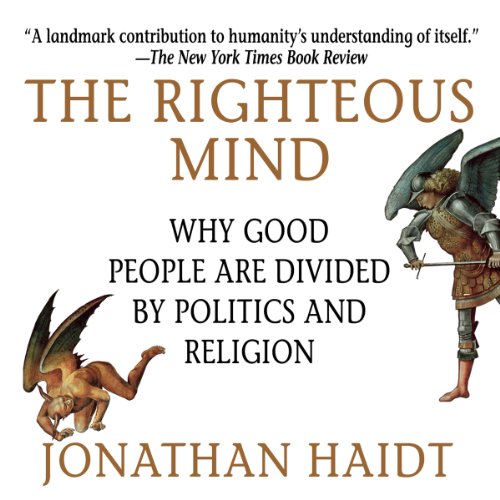The book in a nutshell is captured by the subheading “why good people are divided by politics and religion”. The book can be roughly divided into thirds. The first half of the book is about the origins of morality. Where did it come from? Haidt touches on some philosophical works and debates and ultimately concludes that morality provides evolutionary advantages, and it supersedes reason. He uses an elephant and a rider analogy, morality, roughly equated to emotion, is the elephant. He also uses a president and press secretary metaphor, which I found helpful, reason’s primary function is to rationalize the conclusions of the subconscious.
I’m not sure this story fully explains morality. I think it could explain some of it, and it provides some satisfying guidance but tas far as I can tell it does not obviate the need for extra-human deliberate construction of morality.
Second, he outlines what morality is and isn’t. He rejects utilitarianism and deontology as too narrow, using his own “critique of pure reason” as the backbone of the argument. He describes his research and conclusion, that there are six moral “flavors” that make up the human moral pallet.
1. Care/Harm—Naked and ye clothed me. Sympathy
2.Fairness/Cheating—Law of the harvest.
3.Loyalty Betrayal—No marrying Canaanites. It’s the glue of the team.
4.Authority/Subversion—Follow the prophet, no other god’s, we believe in being subject.
5.Sanctity/Degradation—Holy, Holy, Holy, is the Lord. The body is a temple.
6.Liberty/Oppression—Allow all men the same privilege, let them worship how, where, or what they may.
Ultimately Haidt defines morality as “interlocking sets of values, virtues, norms, practices, identities, institutions, technologies, and evolved psychological mechanisms that work together to suppress or regulate self-interest and make cooperative societies possible.”
The research on this is groundbreaking, and therefore almost certainly incomplete. Still, this jives with my moral intuition and the 5 sets of canon I’m familiar with. I’m willing to accept this as a useful framework.
Finally, Haidt, a self-professed liberal, points to research indicating liberals are conscious almost exclusively to flavors 1,2, and 6 while conservatives are conscious to all 6. The remainder of the book dwells here. Liberals need to be conscious of values 3-5. The most striking evidence of this is that conservatives can accurately guess what their liberal counterparts would answer in morality surveys while their liberal peers struggle to answer as conservatives would. Liberals don’t understand how conservatives think and this creates a difficult rift in the national conversation. Haidt concludes by pointing to policies on both sides of the aisle he thinks have merit.
My frustration with this book is primarily directed at two dimensions. First, the lack of distinction between personal morality and societal legality, and second the descriptive rather than prescriptive approach.
Frustration 2, descriptive, is easier to deal with. Haidt explicitly states that is his intention, and I’m almost okay with that explicit statement as a rational. Moreover, an attempt to prescribe morality would undermine his stance as a neutral arbitrator. Finally, morality resists scientific prescription perhaps like no other facet of human experience. Not only because of the elephant-rider relationship but also because of Hume’s is-ought dilemma; morality IS ought, how can one say ought oughtn’t or ought to be? Still, the lack of a defined value hierarchy births the primary weakness of his argument; many would argue that values 2-5 have no place in the value hierarchy.
My second frustration is more acute and I haven’t found a satisfactory rationale. This seems to be a massive blindspot to many political actors, but especially the left. What is right and what is legal are two separate things, particularly at the federal level. I think extramarital sex is immoral. I do not think it should be illegal. I would never vote for a federal law making it illegal. In fact, I believe it should be legal for Americans to do whatever the bleep they want so long as it doesn’t interfere with another human’s rights to life or property (a libertarian formulation). That doesn’t mean I think all of those things people do are moral. In his analysis, Haidt fails to explain how this view of morality and legality plays into political psychology.
Overall worth a read, but probably doesn’t make my list for all to read.

